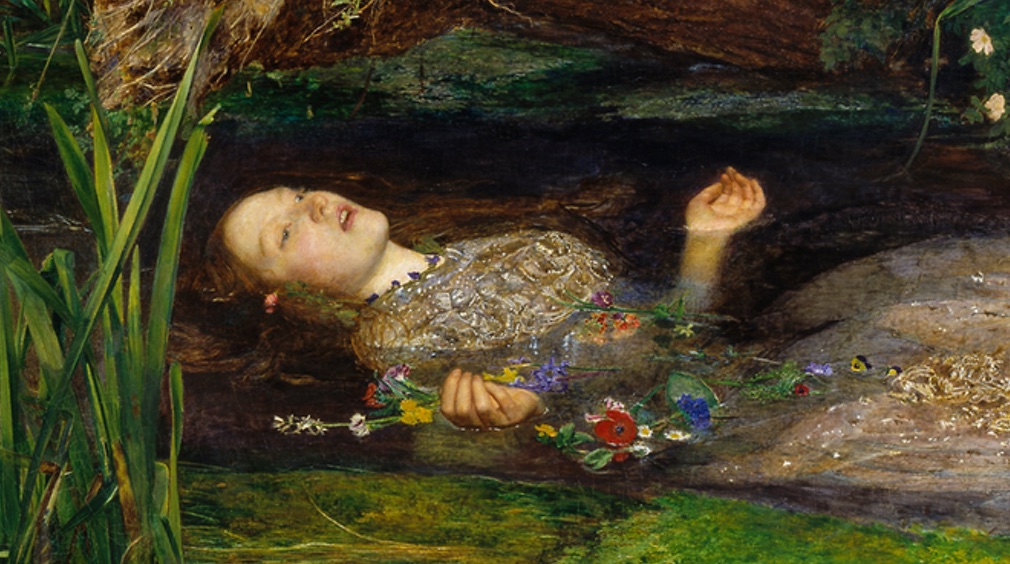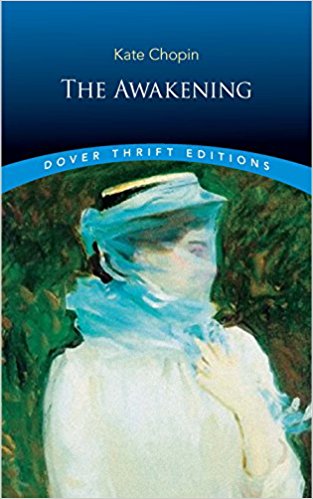The Awakening is a story of a woman who defies her husband then abandons him and her two children to live independently. Her path to self-awareness takes her on extramarital adventures and several phases of emotional torment. To 19th century readers, the ending was just as outrageous as other scenes of the novel. Below is a summary that contains the controversial passages.
The story begins with Edna Pontellier on a beach vacation with her husband and two sons. They’re a wealthy, upper-class family who could afford vacationing on Grand Isle, off the coast of Louisiana. They socialize with other families, one of which is the Lebruns who rent out accommodations for visitors. She can’t keep her eyes off one man in particular: Robert. He’s the young and gallant son of Mrs. Lebrun.
She feels stimulated by the pleasurable experience of the ocean; the smell, the sounds, and the uplifting embrace of the water (even though she struggles to swim). As the vacation progresses, her infatuation with Robert increases. In the meantime, she’s becoming more aware of her own individuality and sensuality. Agonizing mood swings pull her between bliss and despair.
Edna was a woman who never idealized her husband or children. Her husband treated her with respect but spent most of his time away on business trips. Their relationship, though peaceful, was never satisfying to her. After years of yielding to social conventions, a grain of mild rebellion from her younger years was about to sprout. She’s being awakened; emotionally, intellectually and sexually.
Following an evening party that brought together multiple vacationing families, Robert suggests they all have a night swim. Edna had been trying to learn swimming but at that moment she summoned enough bravery to join them and to her own amazement and everyone else’s she ventured out in the sea. She panics right after an impressive performance and swims back to the shore hurriedly. She tells her husband in anger that she could’ve died out there. Her husband feels helpless. She abruptly decides to leave and walk home alone. But Robert rushes to accompany her. At her house, they spent intimate and serene time together on the porch. When Robert hears the sounds of an approaching crowd, he immediately leaves. Léonce sees his wife lying on a hammock outside, he admonishes her for becoming a prey to mosquitoes. He asks her to follow him inside the house.
Another time she would have gone in at his request. She would, through habit, have yielded to his desire; not with any sense of submission or obedience to his compelling wishes, but unthinkingly, as we walk, move, sit, stand, go through the daily treadmill of the life which has been portioned out to us.1Kate Chopin, The Awakening Thrift Study Edition (Chicago and New York: Herbert S. Stone & Co., 1899; reprint, Mineola, New York: Dover Publications, 2010), 31.
She blatantly refuses at first.
The following day, she gets up early before the others, then visits Robert to wake him up. They take a boat together to another island where they spend hours talking. And for a romantic effect, they stay behind to watch the sunset together.
The sentiment which she entertained for Robert in no way resembled that which she felt for her husband, or had ever felt, or ever expected to feel.2Ibid., 47.
Robert realizes that he’s falling for Edna and what a scandalous disaster that could create for their society. He decides to travel to Mexico. Edna is distraught to find out. Later, she explains to Adèle Ratignolle, her friend, who’s utterly devoted to her husband and children, that she misses Robert. She tells her she does not regret harboring these emotions for another man. She feels entitled to her own affections and thoughts – they make a part of her identity which she will not give up for anyone, not even her own children:
I would give up the unessential; I would give my money, I would give my life for my children; but I wouldn’t give myself.3Ibid.
Edna Pontellier, version 2.0, is incompatible with social conventions: she no longer follows the long-established tradition of receiving visitors every Tuesday. She doesn’t even manage the servants to ensure decent family meals are served. The latter forces Léonce, her husband, to protest one day and walk away mid-meal after having an argument with Edna. When she retires to her bedroom, she’s enraged and destructive:
She carried in her hands a thin handkerchief, which she tore into ribbons, rolled into a ball, and flung from her. Once she stopped, and taking off her wedding ring, flung it upon the carpet. When she saw it lying there, she stamped her heel upon it, striving to crush it. But her small boot heel did not make an indenture, not a mark upon the little glittering circlet.4Ibid., 52.
Nevertheless, she continues to ignore all housework and instead pursues her passion of painting. The result is even more heightened tension between her and her husband:
“It seems to me the utmost folly for a woman at the head of a household, and the mother of children, to spend in an atelier days which would be better employed contriving for the comfort of her family.”
“I feel like painting,” answered Edna. “Perhaps I shan’t always feel like it.”“Then in God’s name paint! but don’t let the family go to the devil. There’s Madame Ratignolle; because she keeps up her music, she doesn’t let everything else go to chaos. And she’s more of a musician than you are a painter.”5Ibid., 57.
Ouch!
Léonce visits the family physician and friend and complains about the uncharacteristic behavior of his wife. The doctor wonders if she’s been corrupted by one of those from the emerging movements of women’s rights. Léonce responded that it can’t be true if she withdrew from all social functions and won’t receive visitors. That has become such a problem that she even refuses to go to her own sister’s wedding which would create a severe embarrassment for him:
She says a wedding is one of the most lamentable spectacles on earth. Nice thing for a woman to say to her husband!6Ibid., 66.
She got to respond with a low blow of her own!
Doctor Mandelet advises Léonce to be patient, although he quietly suspects another man might be in her life. Mr. Pontellier goes on a three-month business trip to New York. The children also leave the house to spend time with their grandmother. As a result, Edna feels at peace like she never experienced before.
Later on, Edna meets a young man, Alcée Arobin, at the racetrack where she had been spending a lot of her time lately. Arobin has a reputation of being a philanderer. Their relationship develops quickly and after one day at the races, he accompanies her home and stays behind for dinner. Before leaving, in a grip of desire, he holds her hand and imprints a passionate kiss.
When she was alone she looked mechanically at the back of her hand which he had kissed so warmly. Then she leaned her head down on the mantelpiece. She felt somewhat like a woman who in a moment of passion is betrayed into an act of infidelity, and realizes the significance of the act without being wholly awakened from its glamour. The thought was passing vaguely through her mind, “What would he think?” She did not mean her husband; she was thinking of Robert Lebrun. Her husband seemed to her now like a person whom she had married without love as an excuse.7Ibid., 77.
Edna visits her friend, Mademoiselle Reisz, to whom Robert writes letters from Mexico. Her friend allows her to read them. One time she put Edna on the spot:
“Are you in love with Robert?”
“Yes,” said Edna. It was the first time she had admitted it, and a glow overspread her face.8Ibid., 81.
Later in the evening, Arobin visits Edna at her home and as she was talking about her visit to her friend, he started caressing her face.
His eyes were very near. He leaned upon the lounge with an arm extended across her, while the other hand still rested upon her hair. They continued silently to look into each other’s eyes. When he leaned forward and kissed her, she clasped his head, holding his lips to hers. It was the first kiss of her life to which her nature had really responded. It was a flaming torch that kindled desire.9Ibid., 83.
That kiss marks her first act of infidelity. After he leaves, she feels slightly guilty when she takes notice of all the material possessions around her brought by her husband. However, she was still not ashamed. In fact, her main regret was being unfaithful to Robert. Also, she’s disappointed in how her actions are triggered by lust, not love.
While her husband was still overseas, she unilaterally makes a decision:
Without even waiting for an answer…regarding his opinion or wishes in the matter, Edna hastened her preparations for quitting her home…10Ibid., 84.
Edna throws a party in celebration of her freedom at her new smaller house. After everyone leaves, Arobin stays behind to assist her shut up the place and walk with her to the nearby small house into which she’s moving. Inside her new house, he tells her he’s about to leave but…
He seated himself beside her and kissed her lightly upon the shoulder.
“I thought you were going away,” she said, in an uneven voice.
“I am, after I have said good night.”
“Good night,” she murmured.
He did not answer, except to continue to caress her. He did not say good night until she had become supple to his gentle, seductive entreaties.11Ibid., 93.
She gave in to her sexual desires and his persistent seduction. They have become lovers.
Edna goes to visit Mademoiselle Reisz, who turns out to be away. She goes inside anyway and while looking around the place, Robert shows up. He’s back from Mexico. She’s in astonishment to see him again and their interaction is awkward. It lacks the warmth they once had for one another. Edna continues her physical relationship with Arobin, but her flame of love for Robert never burns out.
Robert bumps into Edna at her favorite café. Their conversation is more open this time and he accompanies her home. She goes to wash up while Robert is seated waiting for her. When she comes back…
“Robert,” she said, “are you asleep?”
“No,” he answered, looking up at her.
She leaned over and kissed him—a soft, cool, delicate kiss, whose voluptuous sting penetrated his whole being-then she moved away from him. He followed, and took her in his arms, just holding her close to him. She put her hand up to his face and pressed his cheek against her own. The action was full of love and tenderness. He sought her lips again. Then he drew her down upon the sofa beside him and held her hand in both of his.12Ibid., 107.
He explains why he’s been distant. He realizes the scandalous nature of of any potential affair and that he had been dreaming of the day when her husband would set her free so he could have her. Her immediate response is sharp:
You have been a very, very foolish boy, wasting your time dreaming of impossible things when you speak of Mr. Pontellier setting me free! I am no longer one of Mr. Pontellier’s possessions to dispose of or not. I give myself where I choose. If he were to say, ‘Here, Robert, take her and be happy; she is yours,’ I should laugh at you both.13Ibid., 108.
That statement was shocking to him. She tells him that finally their dreams could come true:
I love you, only you; no one but you. It was you who awoke me last summer out of a life-long, stupid dream. Oh! you have made me so unhappy with your indifference. Oh! I have suffered, suffered! Now you are here we shall love each other, my Robert. We shall be everything to each other. Nothing else in the world is of any consequence.14Ibid., 109.
Their conversation is interrupted by news that her friend Adèle is in labor. She runs to be by her side after asking Robert to stay put and wait for her.
When she arrives she learns that Doctor Mandelet, who’s also Adèle’s doctor, is late. While waiting, she finds the spectacle torturous and disturbing. Memories of her own labor flood her mind. After the birth is over, Adèle conscious of Edna’s inner struggles, begs her to think of her own children. For the rest of the night, the advice of her friend haunts her. The doctor walks her home and offers to lend an ear if she ever needs a confidant. But his intervention is in vain. She tells the doctor she doesn’t feel she’s under any obligations towards her husband or anyone else, except perhaps, her children.
Inside the house, to her dismay, Robert had left, leaving behind a farewell note saying he walked out of her life because he loves her. He refuses to live a fantasy with a married woman, which would certainly scandalize her if it becomes publicly known. Legally, divorce is not an option and is almost unheard of. She feels devastated and never goes to sleep that night.
She reappears in the following scene at the Grand Isle where the story began but summer is long over. The Lebrun family who’re renovating their cottage are surprised to see her. She tells them she’s there for a swim and a lunch later with them. Then she walks towards the beach house.
Edna had found her old bathing suit still hanging, faded, upon its accustomed peg. She put it on, leaving her clothing in the bath-house. But when she was there beside the sea, absolutely alone, she cast the unpleasant, pricking garments from her, and for the first time in her life she stood naked in the open air, at the mercy of the sun, the breeze that beat upon her, and the waves that invited her. How strange and awful it seemed to stand naked under the sky! how delicious!
…
The water was chill, but she walked on. The water was deep, but she lifted her white body and reached out with a long, sweeping stroke. The touch of the sea is sensuous, enfolding the body in its soft, close embrace. […] She did not look back now, but went on and on, thinking of the blue-grass meadow that she had traversed when a little child, believing that it had no beginning and no end.
…
Exhaustion was pressing upon and overpowering her. [I]t was too late; the shore was far behind her, and her strength was gone.15Ibid., 115.
Following Robert’s final departure and her own rejection of a possible future of uncommitted, salacious relationships she found herself isolated. What sealed her fate was a realization that her children are an unbeatable shackle that will always “enslave her.” She could not see an exit except in suicide. She did so at the same spot where she experienced her sexual and emotional awakening.
You might also like:

Madame Bovary: The scandalous scenes
Why Gustave Flaubert was put on trial for Madame Bovary?
BOOK: MADAME BOVARY

Women in 19th-century novels: Rebellious wives had to die!
Why the heroines of Madame Bovary, The Awakening and Anna Karenina commit suicide?
BOOK: MADAME BOVARY
Endnotes





